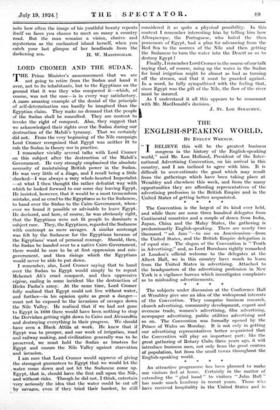LORD CROMM AND THE SUDAN.
THE Prime Minister's announcement that we are not going to retire from the Sudan and hand it over, not to its inhabitants, but to the Egyptians on the ground that it was they who conquered it—which, of course, was not the case—is in every way satisfactory. A _more amazing example of the denial of the principle of self-determination can hardly be imagined than the Egyptian claim. They make no demand that the people of the Sudan shall be consulted. They are content to invoke the right of conquest. Also, they suggest that we acknowledged their rights over the Sudan during our destruction of the Mandi's tyranny. That we certainly did _not. From the very beginning of the Nile campaign Lord Cromer recognized that Egypt was neither fit to rule the Sudan in theory nor in practice.
. I remember vividly several talks with Lord Cromer on this subject after the destruction of the Mandi's Government. He very strongly emphasized the absolute necessity of maintaining British power in the Sudan. He was very little of a Jingo, and I recall being a little • shocked—I was always a very whole-hearted Imperialist ' —at what I then thought the rather defeatist way, with which he looked forward to our some day leaving Egypt He insisted, however, that it would be a most tremendous mistake, and as cruel 'to the-Egyptians as to the Sudanese, to hand over the Sudan to the Cairo Government, when- ever we found it possible or advisable to leave Egypt He declared, and here, of course, he was obviously right, that the Egyptians were not fit people to dominate a subject race. They, the Egyptians, regarded the Sudanese with contempt as mere savages. A similar contempt was felt by the Sudanese for the Egyptians because of the Egyptians' want of personal courage. Should, then, . the Sudan be handed over to a native Cairo Government, there would be sure to be at first oppression and mis- government, and then risings which the Egyptians would never be able to put down.
I remember, also, Lord Cromer saying that to hand over the Sudan to Egypt would simply be to repeat Mehemet Ali's cruel conquest, and then oppressive regime, ending in some incident like the destruction of Hicks Pasha's army. At the same time, Lord Cromer - fully realized that Egypt could not live without water, and further—in his opinion quite as great a danger— must not be exposed to the invasions of savages down the Nile Valley. He realized that if we had not gone to Egypt in 1880 there would have been nothing to stop the Dervishes getting right down to Cairo and Alexandria . and destroying everything in their progress. We should have seen a Black. Attila at work, He .knew that if Egypt was to prosper, and. our work of irrigation, road and railway making, and civilization generally was to be preserved, we must hold the Sudan as trustees for Egypt and ensure the Nile Valley against starvation and invasion.
I am sure. that Lord Cromer would approve of giving the strongest guarantees to Egypt that we would let the water come down and not let the Sudanese come up. Egypt, .that is, should-have the first call upon the Nile, and without risks. Though he did not, I think, entertain very seriously the idea that the water could be cut off by savages, even if they tried their hardest, he still considered it as quite a physical possibility. In this context I remember interesting him by telling him how AlbuqUerque, the Portuguese, who hated the then possessors of Egypt, had a plan for advancing from the Red Sea to the sources of the Nile and then getting the Sudanese to turn the water into the Desert so as to destroy Egypt Finally, I remember Lord Cromer in the course of our talk Saying that, of course, using up the water in the Sudan for local irrigation might be almost as bad as turning off the stream, and that it must be guarded against. In a word, he fully sympathized with the feeling that, since Egypt was the gift of the Nile, the flow of the river must be insured.
As I understand it all this appears to be consonant with Mr. MacDonald's decision.
J. ST. LOE STRACHEY.






































 Previous page
Previous page